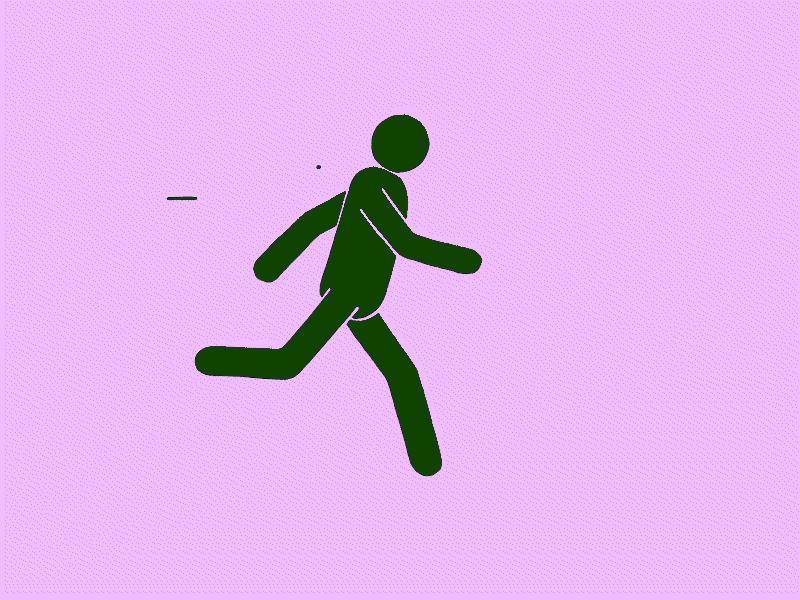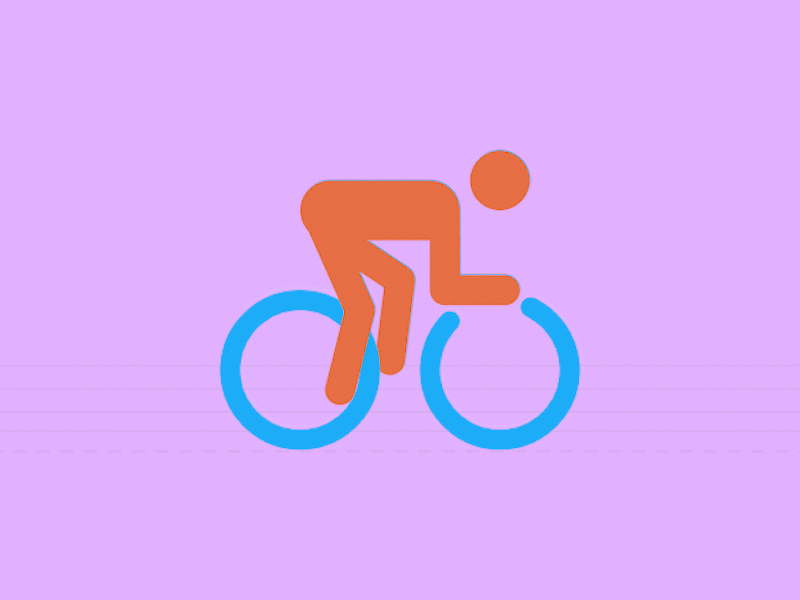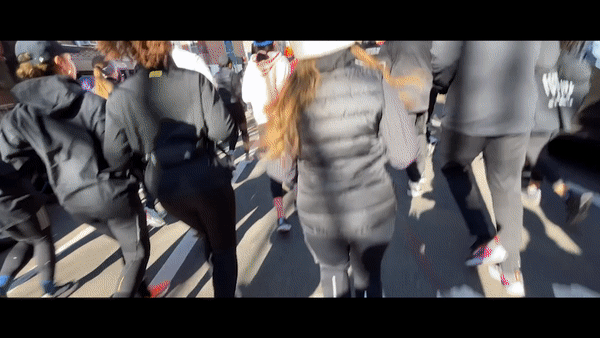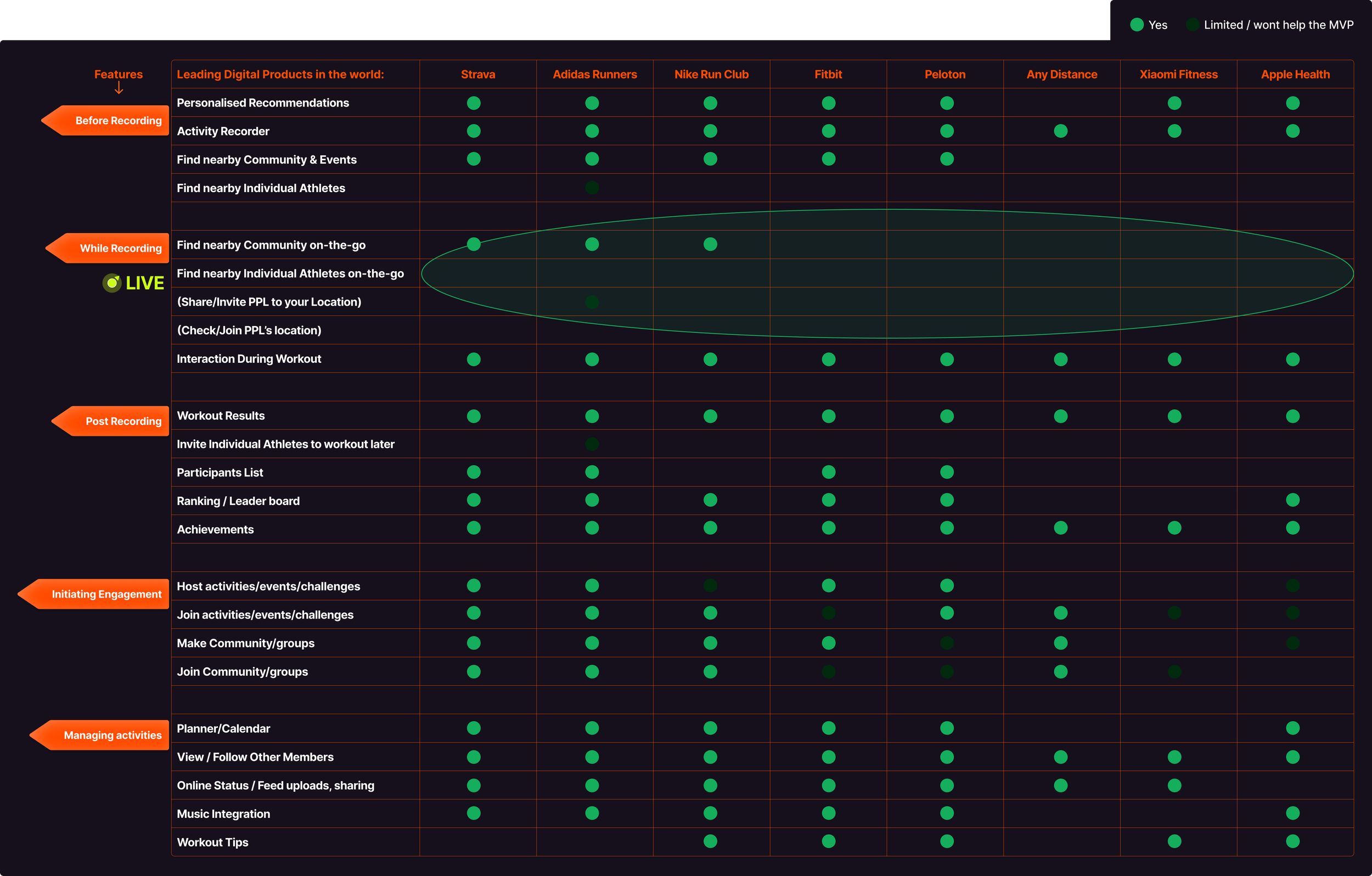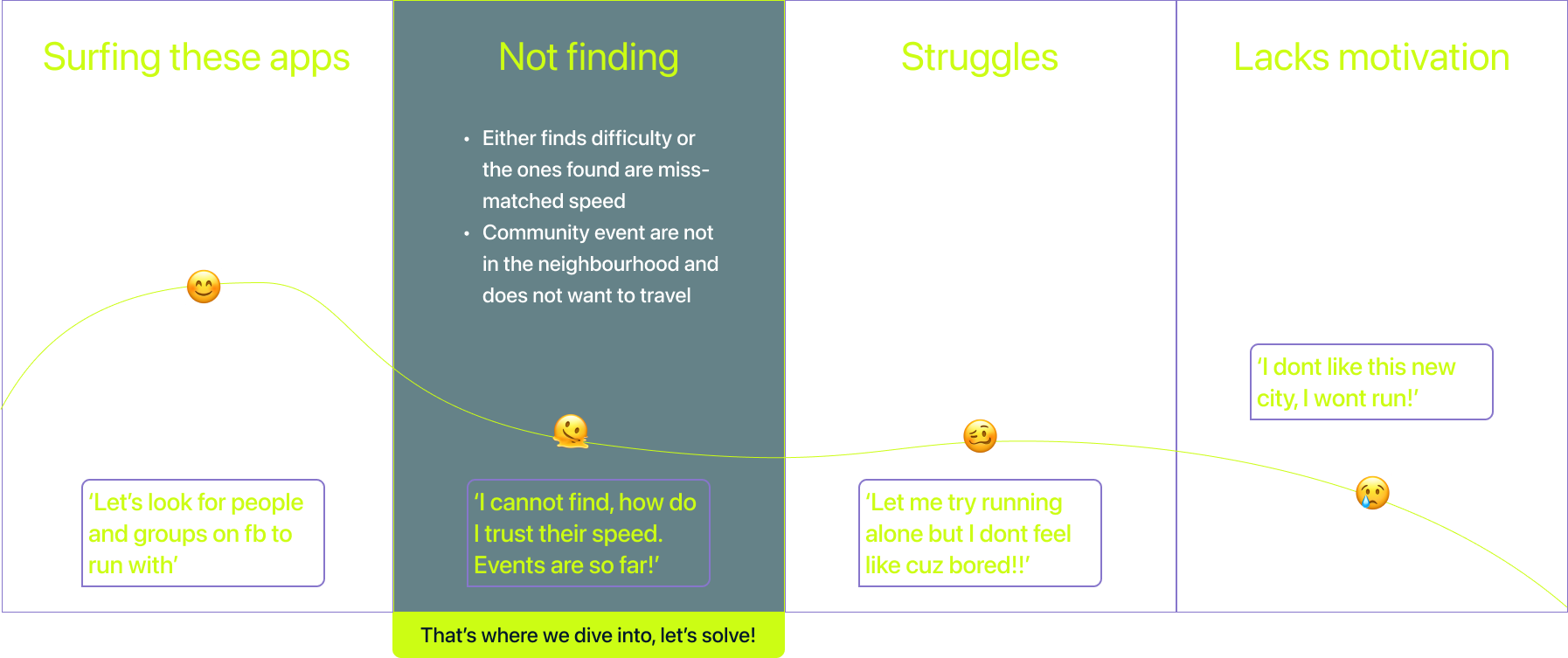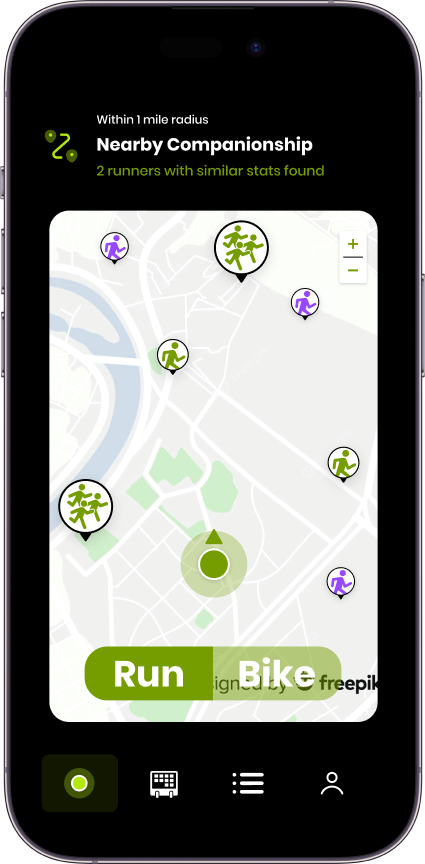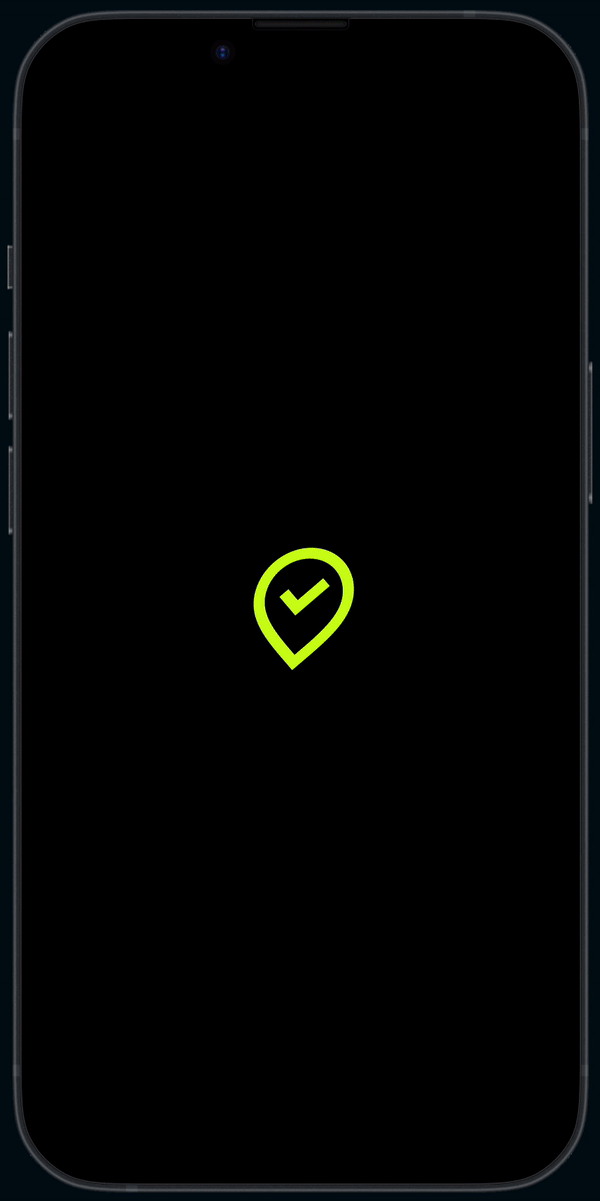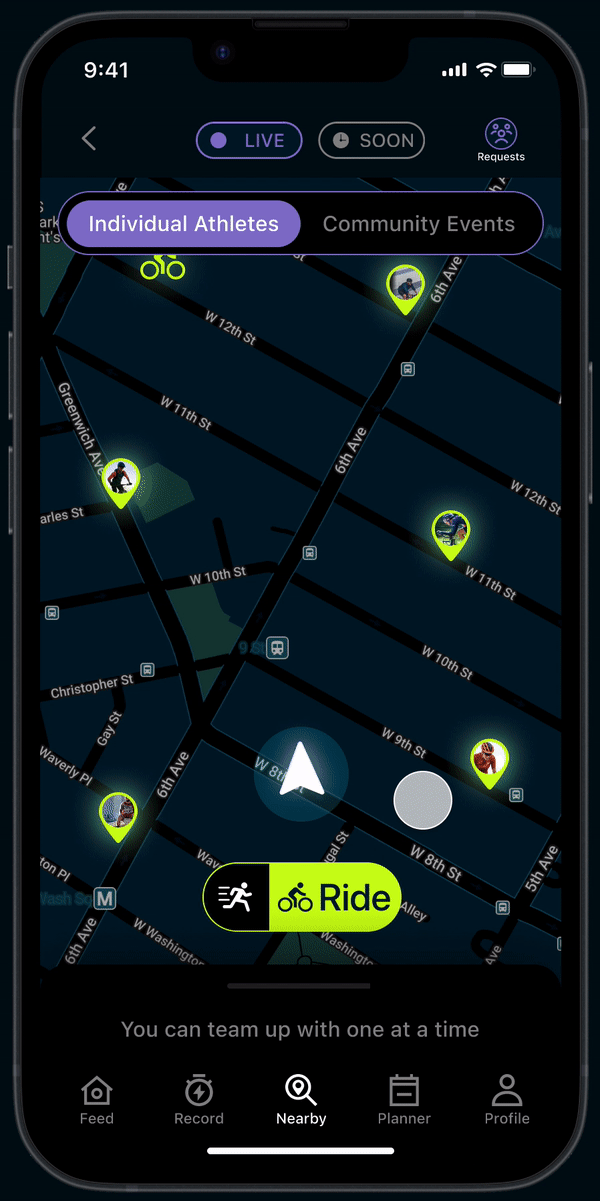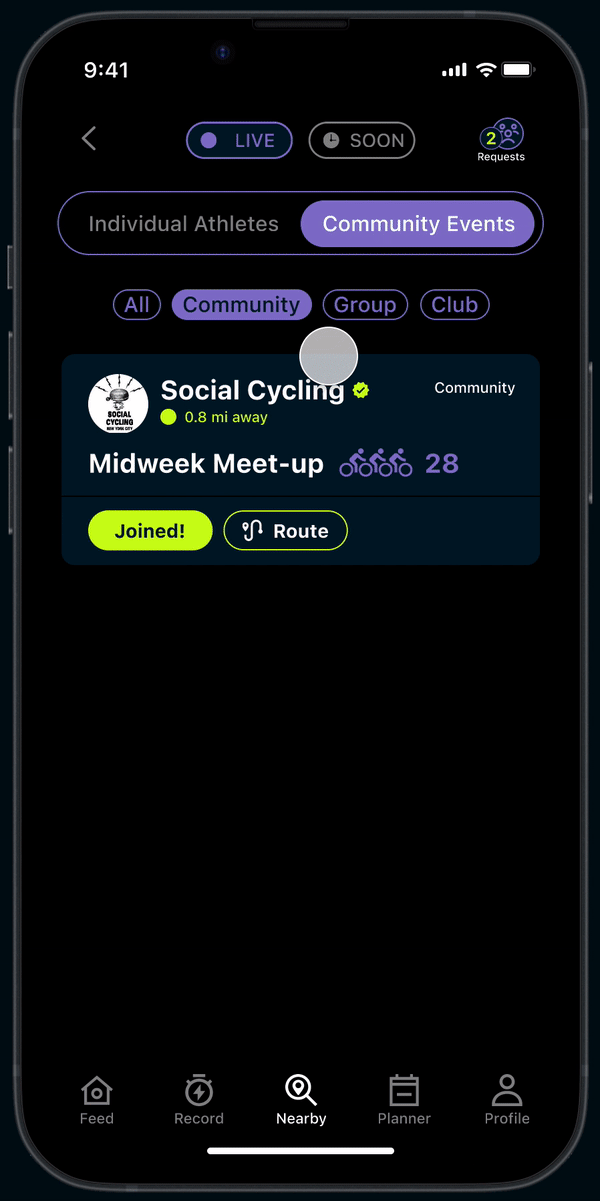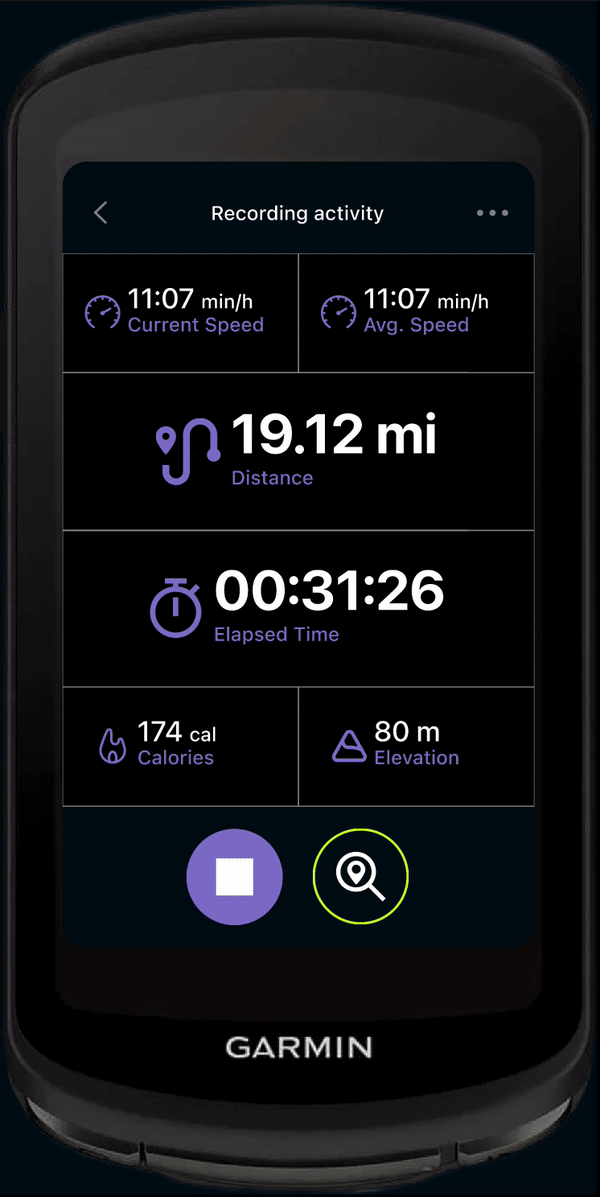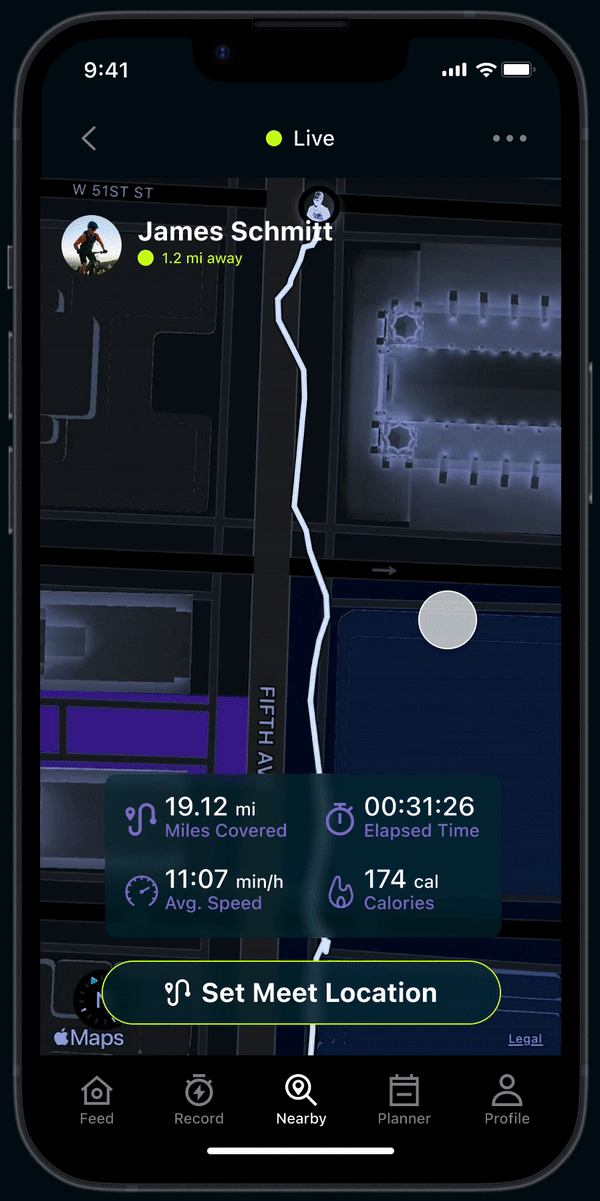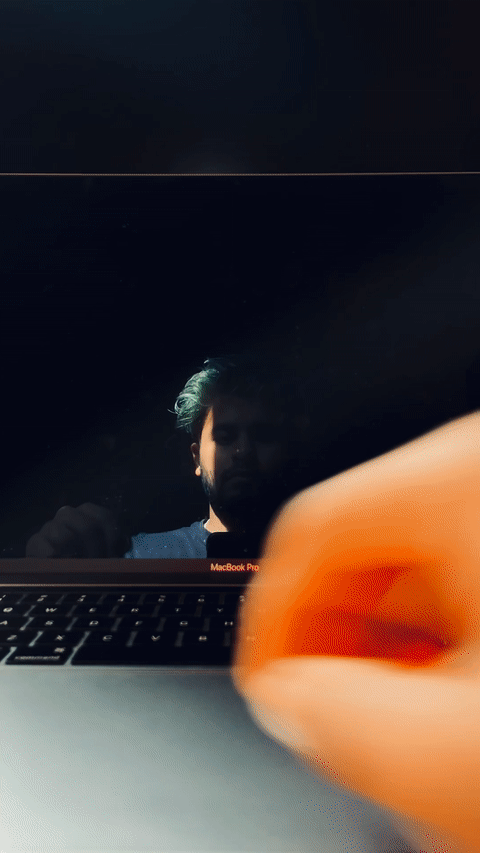
Background:
EnduroMeet is a digital solution to help connect endurance athletes in the same neighborhood, ON-THE-GO! Whether an amateur or a pro, the app helps you find accountability pals, events, and communities that suit your skill level.
Scope:
UX/UI Design
User Interviews
User Testing
Research & Insights
Branding
Design System
Prototyping
Team:
Solo Project
Role:
User Researcher
Product Designer
Tools:
Figma, FigJam,
Adobe Creative Suite
Duration:
15 Weeks (2023)
About the app.
Discover nearby athletes who share similar skill levels. Explore communities in your neighborhood. Receive tailored suggestions of individual athletes and plan meet-ups. Coordinate navigations after teaming up. Track your activity with companionship. Share your achievements and stay accountable.
EnduroMeet for bike athletes!
Enhance your EnduroMeet experience by pairing the app with your bike computer. Sync stats, share real-time location (with consent), and easily find nearby accountability partners during the ride. Visual tapping on maps enables convenient meet-ups and seamless navigation with fellow cyclists with guided directions.
EnduroMeet on a Smartwatch!
EnduroMeet integrates with fitness watches as well. Use your watch to track your performance, receive nearby athlete recommendations, and engage with the right accountability. Finding companionship on your fitness watch with fitness goals.

Case Study:“Endurance sports are not just about the individual; they are about the collective spirit and the support we receive from those around us. When we come together as a community, holding each other accountable and providing companionship, we find the strength to push through the toughest challenges.”
Background
As an endurance athlete, I experienced the immense benefits of having supportive companions and communities in my hometown. However, after moving to New York, finding the same level of accountability, whether individually or within the community, became a challenge. Joining multiple communities proved time-consuming, managing various apps and schedules became complex, and my motivation suffered as a result. This situation prompted me to question if others faced the same dilemma.
Project InspirationResearch
After conducting user interviews with fellow endurance athletes, it became evident that finding individual athletes who possess similar skill levels and meet safety standards has proven to be a formidable challenge.
Problem DiscoveriesField Research
Observational ResearchTo start off, first I had to go out to do the observation along with participating in the activity. I went out and joined various communities to understand the different dynamics of how they connect and meet up with each other. While in the middle of this on-field experience, I had conversations with these active participants gaining valuable insights into their ways of connecting and hosting meetups.
After the interactions and experiences that I had, I came to the conclusion that accountability significantly increases endurance athletes' commitment to their goals since endurance sports like long-distance running and cycling need massive mental strength for long hours of workout.
To gain a comprehensive understanding of the needs and preferences within the endurance community, I targeted a diverse group of running and cycling athletes. This included full-time and part-time professionals, as well as enthusiasts and casual participants.
The common thread among all interviewees was their familiarity with city lifestyle, utilization of digital fitness tracking products, and knowledge of social fitness apps and endurance fitness culture.
User GroupUser Research
Prajakta S, 30
Part-time Cyclist / Intl. Badminton Player
Mumbai, India
Jaipur & Goa, India
Sudhanshu V, 28
Elite XC Racer | Wedding Photographer
Urmila Sarkar, 54
Casual Runner | Science Professor
Mumbai, India
Mumbai, India
Rajat Bhele, 29
Cycling Enthusiast | Design Director
Jamilé R, 30
Long Distance Runner | Adidas Run Captain
NYC, US
NYC, US
Madiha Z, 32
Ultra Marathoner | Adidas Crew Runner
Noel Tanner, 45
Part-time Triathlete | Marketing in Meta
NYC, US
The objective of the interviews was to gather valuable insights and gain a comprehensive understanding of the challenges faced by these endurance athletes regarding community meet ups and individual companionship. The primary aim was to delve into their needs, pain points, and preferences, enabling the development of a tailored and effective solution to address their specific requirements.
Interview GoalsUser Research
Interview questionnaires objectives:
Fitness Habits
Equipments and Technology used
Accountability & Individual Companionship
Social & Community Support
Scheduling and Time Management
Motivation and Challenges

Athletes faced difficulties in tracking multiple community events due to a lack of consolidation. Connecting on social media required extra effort, and managing multiple community apps alongside 9-5 jobs was complex. Additionally, the absence of a dedicated system made it challenging to connect with individual athletes in real-time.
The Real ProblemUser Research Synthesis
The users said:
These athletes faced challenges in finding workout partners who were available to train together at their desired time.
Part-time athletes with 9-to-5 jobs struggled to join community events due to a lack of consolidated event viewing and planning system. Managing and tracking these events across multiple online platforms was burdensome.
It was noticed that a few wished to make real-time connections in their neighbourhood. There wasn’t a precise digital tools for endurance athletes to connect in middle of their workouts.
Actionable Insights These insights conveyed similar meanings but focused on slightly different aspects
User BehaviourUser Research Synthesis
Individuals meet-up aspect :
Most athletes rely on popular social media platforms such as Strava and Facebook to connect and share their performance statistics. Some athletes also use apps like WhatsApp to share and track their friend’s live locations and coordinate meet-ups while using other apps for activity tracking. However, the process of combining these features can be complex for users.
Community meet-up aspect:
Based on the interviews, I discovered that many sports brands offer their own apps for hosting community events and meet-ups. Additionally, athletes commonly rely on platforms like Strava and Facebook to join unrecognized or non-branded communities that lack dedicated platforms. The athletes expressed a strong desire for a single centralized portal that could display community events based on their current location and serve as a comprehensive hub for their needs.
Product Usage Analysis:
After conducting interviews with these athletes and conducting desk research, I analyzed and evaluated the usage patterns of this group of endurance athletes. This analysis shed light on how these athletes have been navigating the limited digital environment to fulfill their desire for connection and meet-ups.
Furthermore, it led me to conduct an industry audit of the existing digital products in this domain.
20%30%50%Community Dedicated Apps: Adidas, RCC, Running, Nike Run Club, Runkeeper, Komoot
Fitness Apps:
Strava, Garmin Connect
Social Media Platforms: Meetup, Facebook, Instagram, What’s App, Signal, Many more..
Adjacent Industry Audit
Competitive Analysis ‘unmet user needs’
To gain insights into the competitive landscape of digital fitness products in the industry, I conducted a heuristic analysis. During this process, I identified 'unmet user needs' pertaining to location sharing and real-time interactions during workouts. It was surprising to find that industry-leading apps had not introduced such features, creating a significant gap. With this understanding, I set out to fill these gaps and provide a solution.

ScenarioJourney Map
A user moved in to a new city and constantly trying to connect with athletes sharing similar skill level but in their own neighbourhood.

How Might We...?Help endurance athletes locate fitness athletes & communities within their neighbourhood ?
Maybe a Tracker with Map?
Help people working 9-5 to find fitness companions with flexible schedules?
Maybe a Fitness Calendar?
Help endurance athletes to connect real-time workout partners sharing same interests & skill preferences?
Maybe a Planner?

Low-Fi PrototypeSolution Discovery
During the ideation process, I explored various directions and possibilities to create a solution that effectively addressed the athletes' problem. To guide the solution development, I created multiple low-fi sketches that provided some guidelines while encouraging a creative approach.
After conducting user testing on these low-fi concepts, I narrowed them down and iterated on three distinct concepts for the mid-fi prototype. These concepts included
Mid-Fi PrototypeUsability testing & Iteration
Calendar
In calendar design, you click on the date for accessing events and athletes doing activity live on later.
Maps
A map design for location-based interactions for accessing events and athletes doing activity live on later.
In Activity
An integration with fitness watch. While recording, in the middle of activity be able to access & join nearby events and athletes.

Athletes who actively track their activity on various fitness apps and devices strongly preferred the idea of visually tapping on maps to locate and connect. This approach resonated with them and felt intuitive.
70% of users emphasized the importance of seamless integration of all concepts, with the map approach as the central feature. They saw value in having the other mid-fi concepts as additional supporting features.
Safety was a top concern, with 90% of users (mostly women) suggesting the need for consent and approval options for location sharing.
Middle-aged users expressed a desire to find individual companionship with similar interests, whether related to hobbies or professions.
40% of users requested the ability to find individuals or communities with similar skill levels, with an option to adjust skill level for different activities.
Addressing the demands of bike athletes, it was crucial to design a consistent experience for bike computers.
Results Testing Synthesis
User Feedback:
These insights were obtained through usability testing of the mid-fidelity prototype.
I focused on enhancing the real-time aspect of the app, making it the core feature and the primary focus of the user experience. Similar to how Google Maps or Uber displays real-time location updates and shows nearby options, I designed the bottom navigation to prioritize this functionality. By emphasizing the real-time aspect as the hero flows of the app, I aimed to provide athletes with instant access to live location tracking, connecting with others in real-time, and discovering nearby activities.
System MapSynthesise & Product Flow

Final Design
The Product Prototype‘How might we help endurance athletes to connect real-time workout partners sharing same interests & preferences?’
Facilitating connections beyond endurance to help athletes find meaningful connections based on shared interests and preferences!
On Boarding: The app begins with a captivating launch screen animation, inviting users to sign-up. During sign-up, users are prompted to specify their interests and hobbies, which are showcased on their profile. This feature enhances the HWM statement, fostering engaging conversations and meaningful connections between users.
‘How might we help endurance athletes to connect real-time workout partners sharing same interests & skill preferences?’
Facilitating connections with similar skill levels was a key consideration. Endurance athletes have a strong awareness of their speed, time, and distance, making it easier for them to configure their own skill level and customize their workout intensity.
Activity Configuration: Upon signing up, users can set their workout intensity to receive recommendations of athletes with similar skill levels. This feature aligns with the HWM statement, and creates opportunities for collaborative workouts, friendly competition, and mutual support for each other.
- ‘How might we help endurance athletes locate fitness athletes & communities within their neighbourhood?’
- ‘How might we help people working 9-5 to find fitness companions with flexible schedules?’
To address the given HMW goal, I created an approach of leveraging location-based services and user-generated data which curates a tailored list of athletes & communities in real-time with similar skill preferences.
Send Join Request: After setting up their desired skill level, the user gets a consolidated recommendations of athletes matching their skill level and community. With a simple tap, users can send a join request to express their interest.
Prioritising Safety Through Consent!
The user↓
Recipient on bike↓
To prioritise safety, I implemented a consent feature that ensures athletes have control over their interactions and engagements. This feature fosters a secure and trusted environment for users to connect with each other.
Decide and check: Once a user sends a request to connect with other athletes, the recipient has the option to review and confirm the connection. This step allows athletes to make informed decisions about the connections they want to establish, promoting a mutually agreeable and comfortable experience for all users, further sharing their live locations.
How to setup a convenient meet-up now?
Just like Uber, the app's user interface simplifies the coordination between athletes, allowing them to effortlessly connect and plan a convenient meet-up spot.
Set meet-up: Once the live locations are share, it lets users easily set a mutual meet-up location. The platform suggests a central location based on their respective mile radius (customisable), ensuring convenience for both parties involved.

Further, these athletes get rewarded for their commitment to accountability and the invaluable companionship they provide each other.Visual System
Branding & Design SystemActivity
Locate
Consent
Meet
Request
Set of dynamic symbols identifying the product’s core aspect.
Dynamic logo design capturing the overall brand identity.
Sneak-Peak
Design System of the app
by Dinamo
by Apple
Typography

Moving Forward Explore more features and refinements
More quantitative research
Expand scope beyond MVP
Accessibility
Collect heat map data
Key LearningsEnd-to-end product development cycle
Extensive research and its value
Personal touch to the design system
Design system
Always ask for feedback
Thank You!!Instructors Lynn & Adam
Peers and fellow athletes
Credits:Riddle UI
Dinamo
Alexandr Sidorovich
Amos Gyamfi







